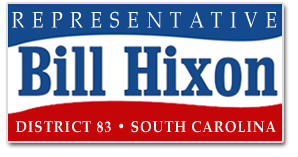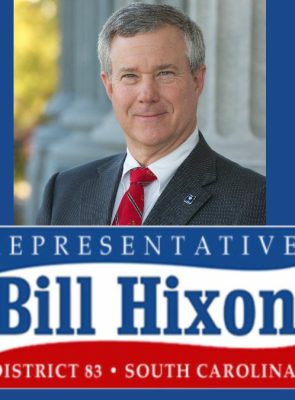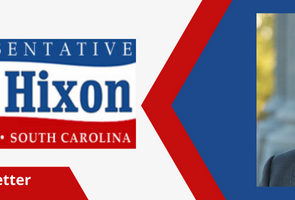Our 5th week of legislative work in 2017 was the busiest yet as committees and subcommittees continued to iron out a wide variety of legislation. The legislative process requires most bills to begin in committee for in-depth examination prior to being debated and voted upon by the full House body. In fact, hundreds of bills are sent to committees and subcommittees each year, but most never make it to the House floor. This week I'll highlight a few bills that have moved from committee to the House floor.
Business License Reform
Current state law allows cities to levy business licensing fees on businesses that wish to operate within city limits. For years the business community has sought reforms to this structure to reduce the burdens placed on businesses while still ensuring businesses pay their fair share and contribute to the operating funds of cities in which they exist. Business advocates say the current law creates incentives for businesses to locate outside city borders, effectively avoiding the licensing fees, which in turn can drive up the cost of doing business. A pro-business reform that would address these issues has cleared a key House committee last week and now heads to the House floor for a full vote.
Movement on Roads Legislation
It's abundantly clear the number one issue in South Carolina today is addressing the unsafe state of our roads and bridges. We currently lead the nation in traffic fatalities – surpassing even large states like California and Texas in annual traffic deaths. This week a bill aimed at fixing our broken roadways cleared the House budget-writing committee by a vote of 20-0. The legislation would give the Governor control of the South Carolina Department of Transportation, raise the road user fee by 2 pennies per gallon each year for 5 years, and create a Highway Maintenance Trust Fund to ensure 100% of revenues go directly (and only) toward our roads and bridges. The proposal now goes to the House floor for debate and a vote.
Freedom of Information Act
Finally, a bill that would establish a Freedom of Information Act Office for use by citizens and journalists has cleared a final vote in the House Judiciary Committee. The pro-transparency measure would streamline the current process used by those seeking access to government documents. After all, government operates in the public sector and the laws instituting the FOIA process are intended to ensure the business of the public remains public. This bill enhances those laws and makes compliance easier and cheaper for both government entities and those seeking government documents alike
In order for me to have a strong voice in Columbia, I have to communicate with my constituents. And that is you! My website, newsletters, mailers, and Facebook are the communication tools that I use. It takes extra time, staff, and campaign funds to maintain these tools.
If you would like to contribute, please mail a check to Hixon for House, P.O. Box 7927, North Augusta, SC 29861. You can also make a contribution online on my website.
I hope that you find this update helpful and informative. If I can help you with an issue, please let me know. Thank you for reading and allowing me to serve you.
|
Legislative Update – February 20, 2017 |
The House of Representatives amended, approved, and sent the Senate H.3218, a bill to provide for "dams and reservoirs safety act" enhancements in light of problems experienced during the catastrophic floods of October 2015 and Hurricane Matthew one year later. The legislation affords the Department of Health and Environmental Control regulatory authority over smaller dams that are currently exempt from regulation in instances where DHEC determines that the dam's failure or improper reservoir operation may cause serious damage to homes, industrial and commercial facilities, public utilities, main and secondary highways, or railroads. Such smaller dams have only been subject to DHEC regulation when the department determines that their failure may cause loss of human life. The legislation makes provisions for maintaining more extensive and up-to-date records on regulated dams and reservoirs by requiring their owners to provide DHEC annually no later than July first of each year with current contact information regarding the owner, including name, home or business address, phone number, and any email address, together with a completed dam owner checklist on a form provided by the department. The owner of a dam or reservoir classified as a high or significant hazard is required to provide DHEC annually no later than July first of each year a current emergency action plan, including updated contact information for emergency management officials, such as police, fire, EMS, or utility departments or personnel, and for downstream residents and business owners located in the inundation zone for that dam or reservoir. The legislation specifies that it is not, however, the owner's responsibility to notify any downstream residents or business owners located in the inundation zone of a failure or potential failure. The owner must, instead, notify emergency officials and DHEC's Dams and Reservoirs Safety program of the actual or potential failure, and it is the responsibility of the emergency management officials identified in the emergency action plan to inform those located in the inundation zone and to cause them to be evacuated if it is considered necessary. Under the legislation, DHEC shall not require any changes to a dam or its appurtenant works due to the reclassification of the dam unless failure would likely cause loss of life, or the department, through inspection, identifies repairs that must be made.
 The House amended, approved, and sent the Senate H.3340, a bill addressing the repair of roads in the state highway system that ran along the top of breached dams. In the interest of public health and safety, the legislation establishes deadlines for the owner of a failed or breached dam which has a public road or highway in the state highway system running across the top of it to provide a written notification to the State Department of Transportation and the Department of Health and Environmental Control indicating whether or not the owner intends to repair the dam to appropriate standards and the date by which the repairs are anticipated to be completed. Provisions are made for notifying dam owners of these reporting requirements. The legislation establishes a protocol for how the Department of Transportation is to proceed with road repair efforts if no written communication is received from a dam owner, if a communication indicates a dam owner does not intend to repair the dam, or if intended dam repairs are not completed as scheduled.
The House amended, approved, and sent the Senate H.3340, a bill addressing the repair of roads in the state highway system that ran along the top of breached dams. In the interest of public health and safety, the legislation establishes deadlines for the owner of a failed or breached dam which has a public road or highway in the state highway system running across the top of it to provide a written notification to the State Department of Transportation and the Department of Health and Environmental Control indicating whether or not the owner intends to repair the dam to appropriate standards and the date by which the repairs are anticipated to be completed. Provisions are made for notifying dam owners of these reporting requirements. The legislation establishes a protocol for how the Department of Transportation is to proceed with road repair efforts if no written communication is received from a dam owner, if a communication indicates a dam owner does not intend to repair the dam, or if intended dam repairs are not completed as scheduled.The House approved and sent the Senate H.3221, a bill establishing a statewide

program for addressing unsound school district finances which affords the State Department of Education authority that extends beyond academic matters to include fiscal affairs. Under the legislation, the State Department of Education is to work with district superintendents and finance officers to develop and adopt a statewide program with guidelines for: (1) identifying fiscal practices and budgetary conditions that, if uncorrected, could compromise the fiscal integrity of a school district; and (2) advising districts that demonstrate these financial problems on the corrective actions that should be taken. The department must establish three escalating levels of fiscal and budgetary concern so that the State Superintendent of Education can declare a 'fiscal watch', a 'fiscal caution', and a 'fiscal emergency' with regard to school district finances. The succeeding levels of budgetary concern carry increasingly stringent requirements for school district recovery plans, audits, and inspections as well as more intensive technical support from the state department. Should a school district's finances warrant the most severe level of concern prompting the State Superintendent of Education to declare a 'fiscal emergency', the State Department of Education is authorized to take intensive steps including assuming control over the district's financial operations to preclude a default on any type of debt and prevent further decline in the district's finances.
 The House amended, approved, and sent the Senate H.3220, a bill reestablishing the South Carolina education and economic development coordinating council to review the progress, results, and compliance with the Education and Economic Development Act and to make recommendations for better achieving the act's goals of implementing career pathways in the state's public schools and fostering a better prepared workforce and student success in post-secondary education. The council is comprised of the following members representing the geographic regions of the state and must be representative of the ethnic, gender, rural, and urban diversity of the state: (1) State Superintendent of Education or his designee; (2) Executive Director of the South Carolina Department of Employment and Workforce or his designee; (3) Executive Director of the State Board for Technical and Comprehensive Education or his designee; (4) Secretary of the Department of Commerce or his designee; (5) Executive Director of the South Carolina Chamber of Commerce or his designee; (6) Chief Executive Officer of the South Carolina Manufacturers Alliance or his designee; (7) Executive Director of the South Carolina Commission on Higher Education or his designee; (8) Executive Director of the Office of First Steps to School Readiness or his designee; (9) the following members who must be appointed by the State Superintendent of Education: (a) a school district superintendent; (b) a principal; (c) a school guidance counselor; (d) a teacher; and (e) the director of a career and technology center; (10) the following members who must be appointed by the Chairman of the Commission on Higher Education: (a) the president or provost of a research university; (b) the president or provost of a four-year college or university; and (c) the president of a technical college; (11) ten representatives of business appointed by the Governor, at least one of which must represent small business and one whom must represent the health care industry. Of the representatives appointed by the Governor, five must be recommended by statewide organizations representing business and industry. The chair is to be selected by the Governor from one of his appointees; (12) Chairman of the Education Oversight Committee or his designee; (13) a member from the House of Representatives appointed by the Speaker of the House; and (14) a member from the Senate appointed by the President Pro Tempore. A sunset provision is included in the legislation so that the council will expire after five years unless it is reauthorized by the General Assembly.
The House amended, approved, and sent the Senate H.3220, a bill reestablishing the South Carolina education and economic development coordinating council to review the progress, results, and compliance with the Education and Economic Development Act and to make recommendations for better achieving the act's goals of implementing career pathways in the state's public schools and fostering a better prepared workforce and student success in post-secondary education. The council is comprised of the following members representing the geographic regions of the state and must be representative of the ethnic, gender, rural, and urban diversity of the state: (1) State Superintendent of Education or his designee; (2) Executive Director of the South Carolina Department of Employment and Workforce or his designee; (3) Executive Director of the State Board for Technical and Comprehensive Education or his designee; (4) Secretary of the Department of Commerce or his designee; (5) Executive Director of the South Carolina Chamber of Commerce or his designee; (6) Chief Executive Officer of the South Carolina Manufacturers Alliance or his designee; (7) Executive Director of the South Carolina Commission on Higher Education or his designee; (8) Executive Director of the Office of First Steps to School Readiness or his designee; (9) the following members who must be appointed by the State Superintendent of Education: (a) a school district superintendent; (b) a principal; (c) a school guidance counselor; (d) a teacher; and (e) the director of a career and technology center; (10) the following members who must be appointed by the Chairman of the Commission on Higher Education: (a) the president or provost of a research university; (b) the president or provost of a four-year college or university; and (c) the president of a technical college; (11) ten representatives of business appointed by the Governor, at least one of which must represent small business and one whom must represent the health care industry. Of the representatives appointed by the Governor, five must be recommended by statewide organizations representing business and industry. The chair is to be selected by the Governor from one of his appointees; (12) Chairman of the Education Oversight Committee or his designee; (13) a member from the House of Representatives appointed by the Speaker of the House; and (14) a member from the Senate appointed by the President Pro Tempore. A sunset provision is included in the legislation so that the council will expire after five years unless it is reauthorized by the General Assembly.The House approved and sent the Senate H.3442, a bill affirming rights to adopt children in the temporary custody of the department of social services in response to recent South Carolina court opinions that the state's laws do not accommodate such adoptions.
The House approved and sent the Senate H.3517, a bill providing special authorization for charitable hunting and fishing programs for terminally ill youth. Under the legislation, the Director of the Department of Natural Resources may issue special authorization for hunting and fishing to any person not more than twenty-one years of age who has been diagnosed with a terminal or life threatening illness or injury where all license, tags, and fees are waived. Those seeking special authorization must be sponsored by a nonprofit charitable organization that has within its mission to provide opportunities and experiences to persons with life threatening illnesses or injuries.
The House amended, approved, and sent the Senate H.3531, a bill that imposes restrictions on the ownership of large wild cats, non-native bears and great apes as a means of protecting conservation efforts for the welfare of vulnerable, threatened, and endangered species and protecting the public against potential safety risks relating to holding these wild animals in captivity. The legislation's restrictions on keeping all lions, tigers, leopards, jaguars, cougars, cheetahs, snow leopards, and clouded leopards, all bears that are not native to South Carolina and not subject to oversight by the state's Department of Natural Resources, and all species of chimpanzees, gorillas, and orangutans do not apply to a list of exemptions, such as nonprofit animal protection organizations, veterinary hospitals, university laboratories and research facilities, and properly licensed zoos, circuses, and animal breeders. The legislation provides that it is unlawful for a person to import into, possess, keep, purchase, have custody or control of, breed, or sell within this state, by any means, a large wild cat, non-native bear, or great ape, including transactions conducted via the Internet. Someone in legal possession of a large wild cat, non-native bear, or great ape prior to January 1, 2018, is authorized to keep the animal for the remainder of its life subject to the conditions of the legislation which include registering the animal with the animal control authority for the city or county in which the animal is located and immediately notifying the animal control authority and local law enforcement agencies upon discovery that the animal has escaped. The possessor of the animal shall be liable for any and all costs associated with the escape, capture, and disposition of a registered animal. The legislation makes provisions for animal registration, including fees, inspections by local animal control authorities, and the confiscation of non-compliant animals. A violator of the legislation must be fined not more than one thousand dollars or imprisoned for not more than thirty days for a first offense, and must be fined not more than five thousand dollars or imprisoned for not more than ninety days for a second offense.
As always, thank you for the privilege of serving you in Columbia. If I can ever be of assistance to you, or if you have ideas on issues you want me to share with the rest of the General Assembly, please do not hesitate to contact me.



